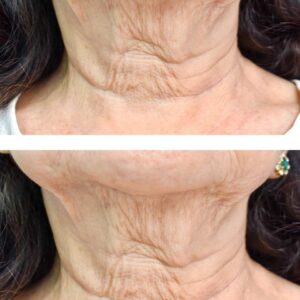In 2004, Connie Culp’s life was changed forever when her husband shot her in the face. It destroyed 80 percent of her face, including her nose and cheeks, leaving her completely unrecognizable. Incredibly, she survived, but her future was uncertain. During a trip to the store, one child even called her a “monster.”
But five years later, Connie got a second chance at life. She received the first near-total face transplant in the US, all thanks to a gracious donor. The surgery, performed at the Cleveland Clinic, took 23 hours and a lot of marvelous work from professionals.
After several further procedures and surgeries, she got a completely new face. And the result was nothing less than incredible.
READ MORE
- Evil “doctor” pumped her face full of cement – this is what she looks like 14 years later
- Gina Anderson was left with a big hole in her face after filler failure – this is her today
Connie Culp and her husband, Tom, hadn’t even finished school when they met and fell in love, embarking on an adventure into the unknown. At 16, they ran off together, even though they didn’t quite fully understand what they were doing.
In the end, the couple opened a bar in an Appalachian town. However, though they were very much in love, Connie’s husband didn’t treat her well.
“My relationship with Tom wasn’t any different than living with my dad. He told me what to do, and I did it. He teased me and called me names. My dad did the same thing, so I just thought it was a normal way of life,” she told Oprah.
After years of being treated poorly, Connie began to stand up for herself.

“He would push me and people would see it, and I would get up and I’d say, ‘I’m a good person, and I don’t deserve that,’” she says. “He wasn’t used to me talking back.”
Connie Culp – first-ever face transplant patient in the US
But on September 21, 2004, Connie’s life changed forever. Her husband accused her of flirting with another man and shot her in the face. He then turned it on himself, pulled the trigger, but survived.
Connie managed to get downstairs and reach her twin sister, Bonnie. Bonnie then called Connie’s daughter, Alicia.
“I always knew that he could really hurt somebody, I knew he had a potential, I just didn’t think it would be my mom,” her daughter recalled.
The blast shattered Connie’s nose, cheeks, the roof of her mouth, and an eye. Fragments were embedded in her face, and the only parts left undamaged were her upper eyelids, forehead, lower lip, and chin.
It was, of course, a horrific charge. But at the time, Connie says she didn’t understand how extensive her injuries were.
“You’re actually in shock, and you don’t feel anything,” she said. “Your adrenaline’s going so fast that there was no pain.”

Luckily, an emergency medical technician happened to be nearby. He scooped up ice and packed it onto her badly injured face to stop the bleeding.
“I could feel my face just sliding down”
Connie was left partially blind, unable to smell and speak, and dependent on a surgical opening in her neck to breathe. She was fortunate to even be alive.
“I lost my sense of smell. I lost my eye, my nose. My jaw they had to wire shut. I didn’t lose any teeth during the [incident], but the top of my mouth deteriorated, so I lost my whole top mouth,” Connie explained.
“I could feel my face just sliding down.”
Her husband was later sentenced to seven years in prison. In 2009, Connie said she forgave her husband the same day. Even so, the couple later divorced.
“I always will [love him.] I mean, I have two kids to him,” Culp said. “But you know what? I cannot be with him anymore,” she told ABC. “I won’t let anybody talk about that, I spent six years thinking about it. And you know what? Now, it’s a new beginning. I have a new face. I’m a new me.”
Over the next five years, Connie underwent 30 surgeries as doctors attempted to reconstruct her face. At the time, face transplants weren’t common. In fact, no one had ever received one in the US.
Connie would become a pioneer as the first person in the US to receive a new face. Of course, it would be a long time before her journey neared its completion.

While she waited, Connie tried to live her life as normally as possible. Sadly, she fell victim to cruel comments from people she didn’t even know.
Connie Culp was called “monster”
On one occasion, while shopping, she heard a child say she looked like a monster.
“‘You said there were no real monsters, Mommy, and there’s one right there,’” Connie recalled, adding that the boy pointed in her direction.
“‘I’m not a monster,’” Connie responded, pulling out her driver’s license to show the child what she used to look like. “I’m a person who was shot.”
Connie underwent several tests, both physical and mental, to make sure that she was in good health, as well as emotionally stable. Unfortunately, they didn’t know when or if they’d ever find a donor, and she knew the groundbreaking surgery could fail. There was even a chance it could leave her looking worse than after the shooting.
Then, one day, on December 9, 2008, the Culp family got terrific news. The Cleveland Clinic had found a donor, a woman named Anna Kasper.
Anna’s family described her as a lovable, giving person. Sadly, she had stepped onto her back porch, lit a cigarette, collapsed in the cold, and passed away. Her family was confident that donating her face to help another person in need would have been what Anna wanted.
“Connie’s like Anna in a lot of ways,” Ron Kasper, Anna’s husband, said.
“As far as her personality and how much she enjoys life and how she smiles and is still able to have such a great attitude after everything she’s been through, and she takes everything in stride.”
“She’s a very special person,” he added. “And Anna was, too.”

“She’d give her time. She’d give her money. She gave a lot of things she didn’t have to other,” Ron added. “When they asked about the [organ] donation, we knew it was what she would want to do.”
“We knew it was what Anna would’ve wanted”
“Everything fit together so well,” Ron said. “We knew that Anna wished to be cremated, so there wouldn’t be an open casket. And that Anna was already an organ donor. And that Anna was a match, and for there to be a match was a miracle in itself.”
“But the overriding factor was we knew it was what Anna would’ve wanted.”
On December 10, 2008, surgeons at the Cleveland Clinic spent 23 hours removing skin and muscle, veins and arteries, teeth and bone from Anna and sewing them onto Connie’s face. The doctors worked long and hard to make it work – and the surgery was a huge success.
“This is amazing both technically, surgically, but also philosophically. The face of someone else is being adopted and accepted by the face of the recipient,” Dr. Maria Siemionow, the Cleveland Clinic surgeon who led the team performing the transplant surgery, said.
“You can see a live person who is happy her life is back.”
Connie had a long road ahead following the transplant, and had to undergo regular biopsies and take plenty of anti-rejection medications.
While it was hoped that the transplant would give Connie some semblance of normality, there were fears that her face would reject it. That could have led to any number of complications, even passing away. Fortunately, Connie made it through, but she had a long road to recovery.

She had to learn how to talk again since the facial muscles had come from her donor. After many days in bed, Connie even had to learn how to walk again. In addition, her brain had forgotten many scents, such as coffee and chocolate, also things she had to “learn.”
Connie Culp’s face transplant surgery
Finally, fifty-eight days after the face transplant surgery, Connie was able to leave hospital for a nearby hotel.
“You know, it was scary when I walked out,” Connie she recalled. “All I could see were my doctors up front because of their white coats. I didn’t even see the reporters. That’s probably the one day I was glad to be blind.”
After some time, she could finally return to Unionport, Ohio, about an hour outside Pittsburgh. Though she’d been through hell, she never lost her spirit – or humor.
“Right from the beginning, I was still cracking jokes,” she said. “It is a miracle,” she added. “I thought I was going to have to live my whole life looking like I did.”
Connie knew from the start that getting a face transplant was not about restoring her looks, but more about improving her function.
“The importance of a face transplant was getting my mouth back in order and letting me smile again,” she told the Post-Gazette.
“And now, for instance, I can drink out of a cup and eat solid food. Before, I had to use a straw all the time and eat soft foods.”

Thanks to the transplant, Connie’s life was once again changed. She began walking her dog and playing darts with her friends. Most importantly, she said people stopped staring at her. The face transplant surgery was a great success. It made her feel “stronger” and “more positive” about herself.
Connie Culp passed away at 57
Unfortunately, her sight couldn’t be saved, and she remained legally blind, with only partial vision in her left eye.
“I just thought, walking around like I was, nobody else would ever want me,’ she said. ‘I realise that I’m not an idiot like Tom always told me.”
Connie could once again smile, talk, smell, and taste her food. Most importantly, she got her confidence back – and even started dating.
The man she was dating gave her a kiss and “told me I was still the same Connie. And he said I was just as beautiful as I ever was.
“When I put my make-up on, I feel pretty,” she said.
Sadly, the story of Connie Culp ended in tragedy. In 2020, Cleveland Clinic spokeswoman Andrea Pacetti announced that she had passed away from complications from an infection unrelated to her transplant. The woman who became the first in the US to receive a face transplant was 57 when she died.
“Connie was an incredibly brave, vibrant woman and an inspiration to many,” Dr. Frank Papay, chair of Cleveland Clinic’s Dermatology and Plastic Surgery Institute, who was part of Connie’s surgical team, told CNN.
“Her strength was evident in the fact that she had been the longest-living face transplant patient to date,” Papay said in a statement. “She was a great pioneer, and her decision to undergo a sometimes daunting procedure is an enduring gift for all of humanity.”





